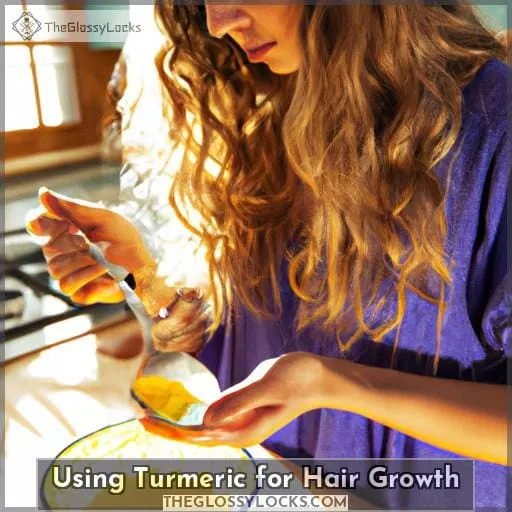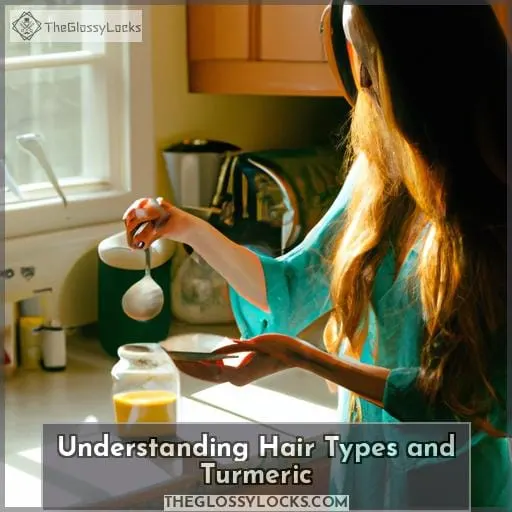This site is supported by our readers. We may earn a commission, at no cost to you, if you purchase through links.
Are you looking for a natural way to boost your hair growth? Turmeric is an ancient herbal remedy with powerful benefits for the scalp and hair. As well as being an anti-inflammatory, it can help reduce dandruff, stimulate new follicles and promote thicker strands.
In this article we’ll explain how turmeric works when used on the scalp, as well as tips on using it effectively in your haircare routine. So if you’re interested in finding out more about how turmeric can benefit your hair health then read on!
Table Of Contents
The Power of Turmeric for Hair Growth

Do you want to learn how to use turmeric for hair growth? Turmeric has been used medicinally in many cultures for centuries, and it’s now gaining attention as a powerful tool to help with hair growth. Understanding the benefits of turmeric and how it helps with hair growth are key parts of using this ancient spice correctly.
The science behind why turmeric works so well on your scalp is fascinating. By comprehending this knowledge, you can make intelligent decisions about incorporating this amazing herb into your daily routine.
Understanding the Benefits of Turmeric
Discovering the wonders of turmeric is like embarking on a magical journey. Its potent properties can help you reach your hair growth goals in no time.
Turmeric offers many benefits when it comes to using natural products for scalp care and hair health. It has antioxidant properties that protect against damaging free radicals, anti-inflammatory support to reduce inflammation related to certain types of hair loss, and turmeric supplements which may help address the underlying cause of some forms of baldness.
Additionally, DIY Hair Masks featuring turmeric allow you to get creative with your own personalized recipes while also benefiting from its healing powers. Furthermore, it’s great for experimenting with new Hair Color Ideas or creating unique hairstyles since it’s safe enough for use daily without causing any damage – making this wonder spice truly versatile!
How Turmeric Helps With Hair Growth
You can unlock the power of natural ingredients to help boost your hair growth with turmeric! Turmeric contains curcumin, which has anti-inflammatory and antioxidant properties. These properties may promote scalp health by reducing inflammation, improving skin health, and easing dandruff flaking and itchiness. Additionally, curcumin in turmeric could lower the levels of DHT hormone responsible for some types of hair loss.
To incorporate turmeric into your hair care routine for maximum benefits on hair growth or thickening, consider combining it with other natural oils such as coconut oil or olive oil that also have beneficial effects on dry scalp. Massage it onto your scalp regularly. Use a shampoo containing this ingredient like Alaffia’s Neem Turmeric Clarifying Shampoo or Love Beauty And Planet’s Turmeric & Tonka Essence Shampoo. Consume liquid forms of turmerics daily raw shot if you want to try its effect from inside out while being mindful about any potential interactions with medications that slow blood clotting. Otherwise, seek advice from medical professionals first before taking them internally.
The Science Behind Turmeric and Hair Growth
Exploring the science behind turmeric and hair growth, have you ever wondered how this powerful remedy can help promote scalp health?
Using essential oils, comparing hair types, examining scalp health, finding natural remedies, and researching herbal remedies are all important elements when it comes to promoting healthy hair.
One such remedy is turmeric – a vibrant yellow root found in Ayurvedic medicine used for its anti-inflammatory properties.
Curcumin – an active compound of turmeric – has been studied extensively as a potential treatment for various conditions, which could even lead to improved blood flow throughout the body’s systems – including your head!
Comparing different hair types allows us to better understand why certain treatments work well on some individuals more than others; however, studies suggest that turmeric may be beneficial for all, regardless of their individualized differences.
So if you’re looking into natural ways to improve your overall scalp health with minimal side effects, then consider trying out turmeric today!
Using Turmeric for Hair Growth
Harnessing the power of turmeric can help you revive your hair and get it growing again. Turmeric is a natural remedy for improving hair growth, as it’s anti-inflammatory and antioxidant properties make it a powerful tool to combat thinning hair, dandruff, and scalp issues. Here are some tips on how to use turmeric for optimal results:
- Ensure safety when using turmeric by consulting with your doctor before consuming or applying topically.
- Provide essential nutrition to the scalp through diet or supplements such as biotin-rich foods like eggs and fish.
- Explore natural solutions such as herbs that promote healthy follicle functioning (e.g., rosemary oil).
- Use products containing curcumin (the active ingredient in turmeric) which helps stimulate regrowth.
- Incorporate cleansing rituals into your routine that involve massaging oils like coconut oil into the scalp.
Depending on your individual needs – including lifestyle factors, genetics, age, etc. – there may be different methods suitable for promoting healthful locks. Consult with a professional to determine what’s best suited for you based on these aspects! With regular use of products infused with this ancient Indian spice tailored specifically towards one’s unique requirements related to their specific type of hair loss/growth pattern(s), an improvement in overall condition should eventually be noticeable over time.
Tips for Using Turmeric for Hair Growth
You may have heard of the many benefits of using turmeric for hair growth, but it’s important to understand both the precautions and side effects as well as best practices for using this natural herb.
It can be particularly beneficial when combined with other ingredients that are known to help promote healthy hair growth.
Before jumping into a regimen involving turmeric, be sure you have all the information so you can make an informed decision about whether or not it’s right for you.
Precautions and Side Effects
Although turmeric can offer many benefits for hair growth, it’s important to be aware of the potential side effects and take precautions when using this powerful herb.
Natural oils such as coconut or olive oil should be used in small amounts during scalp exfoliation, as they’re more likely to improve scalp health without irritating the skin.
Additionally, diet and nutrition play a major role in overall hair health, so make sure you get enough vitamins A & D, which are essential for healthy hair growth.
When creating a DIY turmeric-based mask recipe at home, make sure not to exceed 3 teaspoons per application; too much could lead to an irritated or burning sensation on your scalp.
As part of your regular routine, consider adding natural remedies into your weekly regimen with ingredients like honey, which can help stimulate new cell production and create healthy-looking locks while boosting stem cells from within the root structure of turmeric plants. This may even reduce high levels of DHT associated with any type of balding patterns.
Best Practices for Using Turmeric
Using natural remedies like turmeric can help you achieve thicker, healthier-looking hair and reduce DHT associated with balding patterns. It’s recommended to take 500mg of turmeric twice daily for maximum benefit, but the optimal dosage will depend on individual needs.
One way to use turmeric topically is by mixing it with olive oil and honey into a nourishing hair mask. This can be applied directly onto the scalp, followed by a gentle massage to stimulate blood flow.
Additionally, selecting shampoos or conditioners containing ingredients such as curcumin may offer additional benefits when used as part of your regular haircare regimens.
As with any remedy or treatment option, consulting your healthcare provider before using natural remedies like turmeric should always be done first. This ensures safety and best practices are met for achieving maximum results from its usage over time!
Combining Turmeric With Other Hair Growth Ingredients
Combine turmeric with other natural ingredients such as coconut oil or aloe vera to maximize its hair growth benefits! Adding a few drops of olive oil can help nourish and hydrate the scalp, while providing essential fatty acids for healthier hair.
You can mix up your own DIY recipes by combining turmeric powder with honey, yogurt, or eggs for added nutrition. Natural oils like jojoba and argan are also good additions to any homemade mask.
By using these ingredients together in combination with regular use of organic shampoos and conditioners specifically designed for hair care, you should start seeing results in no time! With proper scalp health maintained through the incorporation of natural oils alongside turmeric-based masks and treatments – all backed by scientific research – achieving healthy looking locks has never been easier!
Understanding Hair Types and Turmeric
You may be wondering how turmeric can benefit hair types 1b and 1c. As a natural remedy, turmeric has been used for centuries in ayurveda to improve overall health and well-being.
Turmeric’s anti-inflammatory properties make it an effective option for restoring moisture balance to the scalp while promoting healthy growth of type 1b or type 1c hair strands. Understanding which benefits are most relevant to your particular needs will help you create a customized approach that is tailored specifically towards achieving desired results with this powerful natural remedy.
Type 1c Hair and Turmeric
For type 1c hair, turmeric can be a great addition to your haircare routine! Turmeric has natural polyphenol compounds which are known for their anti-inflammatory properties. This makes it an ideal choice for type 1c curly or wavy hairstyles.
The curcumin element of turmeric helps provide inflammation relief for the scalp and nourishment to enhance color. It also helps with hydrating effects that strengthen hair texture and improve overall hair health.
So, if you are looking for a natural way to nourish and improve the health of your hair, consider adding turmeric to your haircare routine!
Type 1b Hair and Turmeric
If you have type 1b hair, adding turmeric to your haircare routine can help reduce inflammation and nourish it with its antioxidant properties. Turmeric, a member of the ginger family, has anti-inflammatory powers that can improve scalp health, promote hair growth, and ease flaking and itchiness due to dandruff.
To reap these benefits, incorporate turmeric into your diet through food pairings or herbal mixtures like tinctures or teas. Apply it directly as part of natural scalp treatments such as masks made from mixing raw honey with olive oil. Or make lifestyle changes such as using more natural ingredients in shampoo/conditioner products enriched with turmeric extracts.
Frequently Asked Questions (FAQs)
What are the side effects of using turmeric for hair growth?
Turmeric is a powerful herb that may stimulate hair growth and reduce inflammation. Studies have shown that its active ingredient, curcumin, can lower levels of the hormone DHT responsible for some types of hair loss. However, it’s important to use turmeric responsibly, as it can interact with certain medications and should not be taken in excess.
Is turmeric safe for people with sensitive scalps?
Turmeric is generally safe for people with sensitive scalps, as it’s anti-inflammatory and antioxidant properties can help reduce irritation. Studies have shown that turmeric contains up to 8% curcumin, which has been proven effective in decreasing scalp inflammation.
Feel free to incorporate it into your hair routine!
How often should I use turmeric for hair growth?
You can use turmeric for hair growth by applying it topically or taking it orally. However, if taken orally, you should consult your doctor first and not take it with medication that slows blood clotting.
Generally speaking, a daily raw turmeric shot is recommended to reap the benefits of increased blood flow and thicker hair.
Are there any natural alternatives to turmeric for hair growth?
Yes, there are natural alternatives to turmeric for hair growth. These include rosemary, coconut oil, aloe vera, and jojoba oil. These herbs contain antioxidants that help reduce inflammation and improve scalp health. They can also stimulate blood circulation in the scalp for improved hair growth.
Can turmeric help with hair loss caused by hormonal imbalances?
Turmeric may help with hair loss caused by hormonal imbalances due to its anti-inflammatory and antioxidant properties. Curcumin in turmeric could lower the levels of DHT, which can be responsible for some types of hair loss.
Taking a daily raw turmeric shot could potentially improve scalp health and promote thicker, healthier-looking hair.
Conclusion
To conclude, turmeric is a powerful ingredient for promoting hair growth. It’s anti-inflammatory, antioxidant, and antibacterial properties make it a great choice for people with thinning hair, dandruff, or other scalp issues.
For best results, incorporate turmeric into your hair care routine in various ways, such as a turmeric hair mask or shampoo. For example, one woman with thinning hair saw significant improvement after using a turmeric-infused shampoo for several weeks.
Turmeric can help hair grow longer and stronger, and it’s also a great way to reduce scalp inflammation and dandruff.






